Contents
Introduction
Burrhus Frederic Skinner was a seminal figure in the development of behaviorism, profoundly influencing the field of psychology through his experimental work on operant conditioning.
Educated at Harvard University, Skinner’s research was grounded in rigorous experimentation, leading to the development of the Skinner Box, a device that allowed for controlled studies of animal behavior.
In this article, we explore Frederic Skinner pioneering theories, his experimental methods, and his enduring impact on the study and application of behavioral psychology. Explore more psychologists here. Explore more psychologists here.
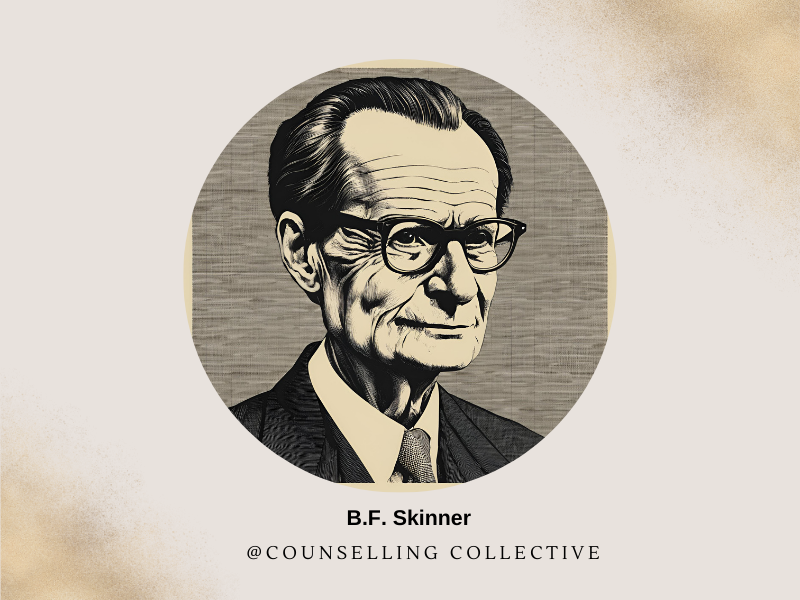
Life Of Burrhus Frederic Skinner
Burrhus Frederic Skinner married Yvonne Blue in 1936, and they had two daughters, Julie and Deborah. Known for his dedication to his work, Skinner often integrated his scientific principles into his daily life and interactions. Yvonne’s support was integral to his personal and professional experiences.
In his later years, Burrhus Frederic Skinner remained actively involved in writing, lecturing, and advancing his theories.
Image Source: letsgethappi.com
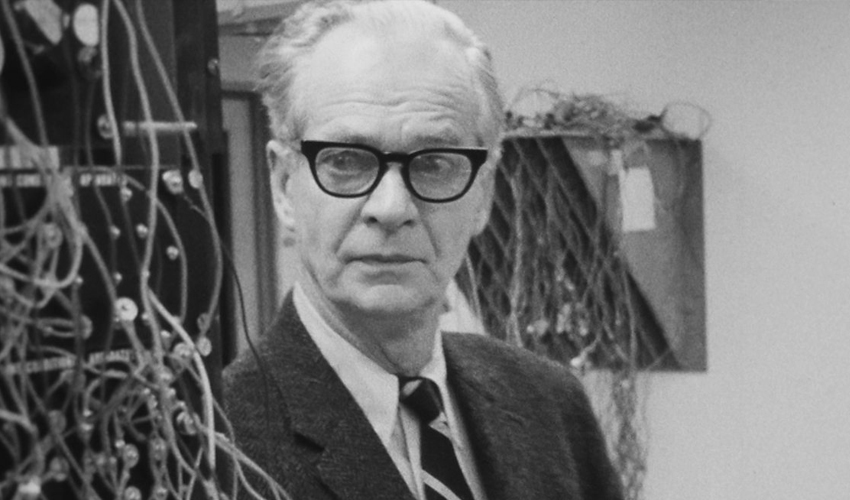
Born on March 20, 1904, in Susquehanna, Pennsylvania, in a family that valued education.
He passed away on August 18, 1990, leaving behind a legacy of significant contributions to psychology, particularly in behaviorism and operant conditioning. His work continues to influence the field, and he maintained a relatively private life outside of his professional achievements.
- Childhood Influence: Early exposure to reading and intellectual engagement fostered an interest in science.
- University Studies: Attended Hamilton College in the 1920s, majoring in English.
- Early Career Shift: Initially pursued writing, but transitioned to psychology under the influence of John B. Watson and Ivan Pavlov, leading to groundbreaking research in operant conditioning.
Education Background of Burrhus Frederic Skinner
| Education Level | Details |
| High School | Syracuse Central High School, Graduated in 1926. Developed an early interest in science and literature. |
| Undergraduate | Hamilton College, Earned a B.A. in English in 1931. Initially studied literature but shifted focus to psychology. |
| Graduate Studies | Harvard University, Completed an M.A. in Psychology in 1931. His studies began to involve experimental psychology. |
| Doctorate | Harvard University, Received a Ph.D. in Psychology in 1936. His dissertation, “The Behavior of Organisms,” established him as a key figure in behaviorism. |
| Postdoctoral Work | Harvard University, Conducted further research in experimental psychology and began work on operant conditioning. |
| Notable Mentor | William Crozier was a key influence on Skinner’s early work, shaping his experimental approaches and theories in behaviorism. |
Notable Works of Burrhus Frederic Skinner
| Theory Details | Details | Significance |
| Operant Conditioning | Developed through experiments with animals, this theory focuses on how behavior is shaped by reinforcement and punishment. | Revolutionized understanding of behavior modification and has applications in education, therapy, and behavioral engineering. |
| Skinner Box (Operant Chamber) | An experimental apparatus used to study animal behavior in a controlled environment, typically involving a lever or button for reinforcement. | Provided empirical evidence for operant conditioning and allowed precise measurement of behavior responses. |
| Verbal Behavior | Explored how language and communication can be understood through principles of behaviorism. | Introduced a behaviorist perspective to language development, influencing subsequent research in linguistics and psychology. |
| Beyond Freedom and Dignity | A book in which Skinner argues that behavior is shaped by environmental conditions rather than internal states or free will. | Criticized and debated extensively, it highlighted the implications of behaviorism for social and ethical issues. |
| Walden Two | A novel presenting a utopian society based on behavioral principles, illustrating how behaviorism can be applied to social engineering. | Demonstrated practical applications of behaviorism in societal contexts and sparked discussions on social change. |
| The Behavior of Organisms | Skinner’s doctoral dissertation, focusing on the principles of operant conditioning and its application to behavior. | Established Skinner’s foundational theories and contributed to the development of behaviorism as a scientific discipline. |
Burrhus Frederic Skinner’s work had a significant impact on psychology and related fields:
Cultural Impact: Burrhus Frederic Skinner theories on operant conditioning transformed behavior modification, influencing education, therapy, and social strategies by highlighting the role of reinforcement and punishment.
Academic Institutions: Skinner made major contributions through his research and teaching at Harvard University and the University of Wisconsin, shaping the field of psychology and influencing the development of future psychologists.
B.F. Skinner’s Notable Inventions
- Skinner Box: This device allowed Skinner to explore operant conditioning, demonstrating how behavior can be influenced by rewards and punishments. It laid the foundation for behavior modification techniques used in therapy, education, and training.
- Cumulative Recorder: By graphing response rates, this invention helped Skinner analyze how different reinforcement schedules affected behavior. It advanced the understanding of behavior patterns and led to the development of more effective behavior management strategies.
- Baby Tender: Designed for infant safety, this crib aimed to provide a hygienic and secure environment. Although controversial, it illustrated Skinner’s application of behavioral principles to practical problems, influencing early child care and safety designs.
B.F. Skinner’s Operant Conditioning Theory
B.F. Skinner’s operant conditioning theory is a key concept in behavioral psychology, focusing on how behaviors are influenced by their consequences. Skinner’s research shows that behaviors are shaped and maintained through reinforcement and punishment.
Key Concepts:
- Operant Conditioning: Learning occurs through rewards (reinforcements) and consequences.
- Operant vs. Respondent Behaviors: Operant behaviors are controlled by their consequences, unlike automatic respondent behaviors (e.g., reflexes).
- ABCs of Behaviorism: Antecedent (stimulus), Behavior (response), Consequence (reinforcement).
- Reinforcement: Strengthens behavior; can be positive (adding a reward) or negative (removing an aversive condition).
- Schedules of Reinforcement: Fixed-ratio, variable-ratio, fixed-interval, and variable-interval.
- Punishment: Aims to decrease behavior; can be positive (adding an unpleasant stimulus) or negative (removing a pleasant stimulus).
Famous Books and Publications

The Behavior of Organisms 1938
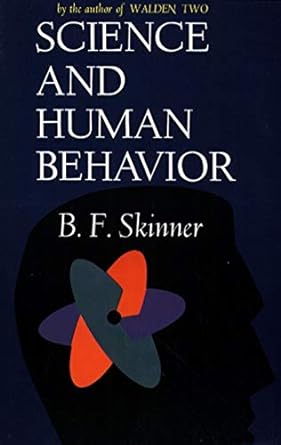
Science and Human Behavior
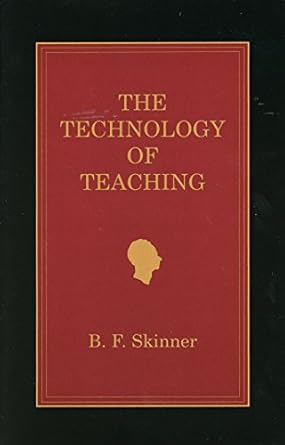
The Technology of Teaching 1968

Beyond Freedom and Dignity 1971
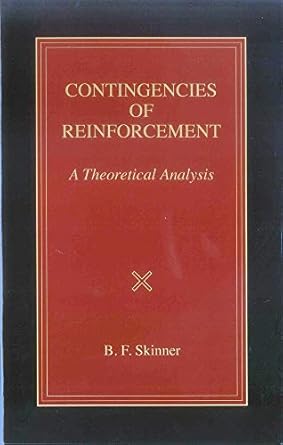
Contingencies of Reinforcement 1969
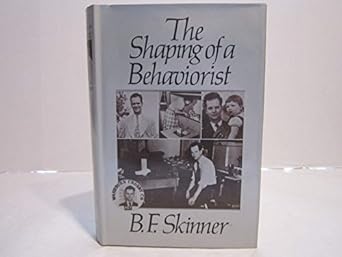
The Shaping of a Behaviorist: 1979

Walden Two by B.F. Skinner’s 1948
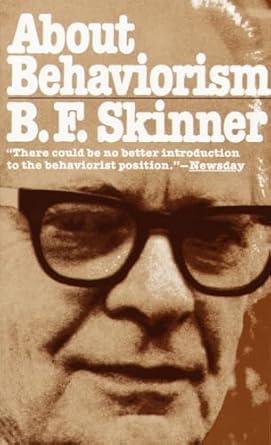
About Behaviorism by B.F. Skinner’s 1974
Influence on Contemporary and Future Psychological Research
- Behavioral Therapy: Skinner’s principles of operant conditioning continue to shape contemporary behavioral therapies, influencing modern treatment methods for various psychological disorders, including anxiety and depression.
- Educational Technology: Skinner’s work on teaching machines and programmed instruction informs the development of current educational technologies and adaptive learning systems, enhancing personalized learning experiences and instructional design.
- Applied Behavior Analysis: Skinner’s research is foundational to ABA, a key approach in treating autism and other developmental disorders, shaping effective intervention strategies and behavior modification techniques.
- Human Factors and Ergonomics: Skinner’s theories on reinforcement and behavior modification contribute to research in human factors and ergonomics, improving design and user interactions in technology and workplace environments.
- Organizational Behavior Management: Skinner’s concepts of reinforcement and behavior shaping are applied in organizational behavior management, enhancing practices in employee training, motivation, and performance management.
Psychologists Influenced by Skinner’s Work
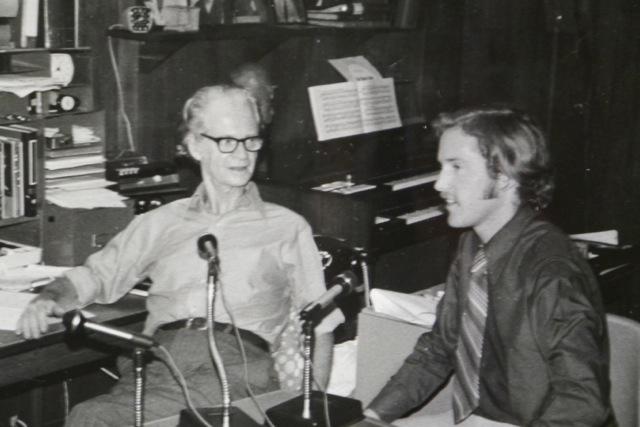
- John B. Watson – The father of behaviorism, Watson’s classical conditioning laid the groundwork that Skinner’s operant conditioning built upon, focusing on observable behavior.
- Albert Bandura – His social learning theory integrates Skinner’s principles of reinforcement with observational learning.
- Jacobs & Hyman – Researchers who applied Skinner’s behaviorist principles to enhance applied behavior analysis in clinical and educational settings.
- Ivan Pavlov – Known for classical conditioning, Pavlov’s work was expanded by Skinner’s research on reinforcement and behavior acquisition.
Legacy of B.F. Skinner’s
- Foundations of Behaviorism: Established the principles of operant conditioning, profoundly shaping the study and application of behaviorism in psychology.
- Advancement of Behavior Modification: Innovative techniques for modifying behavior through reinforcement and punishment, impacting therapeutic practices and behavior management strategies.
- Educational Technology: Pioneered the development of teaching machines and programmed instruction, influencing modern educational methods and technology.
- Applied Behavior Analysis (ABA): Laid the groundwork for ABA, a key approach in treating developmental disorders such as autism, and enhancing behavior modification techniques.
- Influence on Behavioral Economics: Contributed to understanding how reinforcement and behavior modification principles apply to decision-making and economic behavior.
Conclusion
B.F. Skinner’s contributions to psychology have left an indelible mark on the field, particularly through his development of operant conditioning and behaviorist principles. His innovations in experimental methods and educational technology continue to influence contemporary practices in behavior modification, education, and applied behavior analysis.
FAQs
What is B.F. Skinner known for?
B.F. Skinner is known for developing the theory of operant conditioning, which explains how behavior is shaped by rewards and punishments. He created the Skinner Box to study this process in animals and introduced the concept of reinforcement schedules.
How did Skinner’s theories influence modern psychology?
Skinner’s theories, particularly operant conditioning, revolutionized modern psychology by emphasizing the role of reinforcement and punishment in shaping behavior. His principles led to the development of behavior modification techniques, influencing educational practices, therapeutic approaches, and organizational behavior management.
What was Skinner’s main contribution to psychology?
Skinner’s main contribution to psychology was the development of operant conditioning, a theory that explains how behavior is shaped by rewards and punishments. His work with the Skinner Box demonstrated how behavior can be reinforced or modified through systematic application of reinforcement, profoundly influencing behaviorism.
How did Skinner impact education?
Skinner impacted education by applying principles of operant conditioning to learning processes. His work led to the development of programmed instruction and teaching machines, which use step-by-step reinforcement to improve learning efficiency. These methods emphasize immediate feedback and reinforcement, helping to create more effective and individualized educational experiences.
Bibliography
- [1] Skinner, B. F. (1938). The behavior of organisms: An experimental analysis. Appleton-Century.
- [2] Skinner, B. F. (1948). Walden Two. Macmillan.
- [3] Skinner, B. F. (1953). Science and human behavior. Macmillan.
- [4] Skinner, B. F. (1968). The technology of teaching. Appleton-Century-Crofts.
- [5] Skinner, B. F. (1969). Contingencies of reinforcement: A theoretical analysis. Appleton-Century-Crofts.
- [6] Skinner, B. F. (1974). About behaviorism. Vintage Books.
- [7] Skinner, B. F. (1979). The shaping of a behaviorist: A psychological autobiography. Basic Books.
- [8] Watson, J. B. (1913). Psychology as the behaviorist views it. Psychological Review, 20(2), 158-177.
- [9] Pavlov, I. P. (1927). Conditioned reflexes: An investigation of the physiological activity of the cerebral cortex. Oxford University Press.
- [10] Bandura, A. (1977). Social learning theory. Prentice-Hall.






